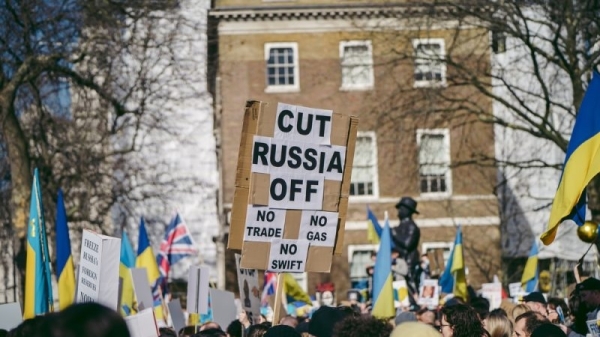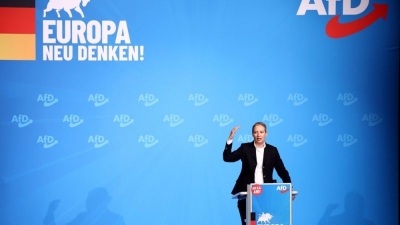Sanctions (don’t) work to stop the war? How Russia uses the narrative against the West

Western sanctions and their effectiveness are one of the favourite topics of Russian propaganda, demonstrating both the importance for the Kremlin of managing this narrative and the real impact sanctions are having on the Russian economy.
Ten years of the Russian-Ukrainian war have been marked by 10 years of various sanctions and international measures aimed at ending this war. In February 2024, the Council of the European Union adopted the 13th package of sanctions against Russia over its war in Ukraine, and the 14th package is already being discussed.
And yet, this is not enough – because the war is continuing and there should therefore be more sanctions.
After exposing crimes in the Kyiv and Chernihiv regions, Ukraine’s President Volodymyr Zelenskyy said: “If there is no truly painful package of sanctions against Russia and if there is no supply of weapons that we really need (…) then this will be seen by Russia as permission. As permission to go further. As permission to attack”.
Judging by the front line that divides the territory of Ukraine with red colours, a truly painful package of sanctions has yet to be adopted.
Russia is doing everything it can to be prepared for Western reaction, including levelling the effect of sanctions with information.
Russia has been using the topic of sanctions to spread disinformation for a long time. First and foremost, such narratives target Russians, to ensure that they do not pay attention to any restrictions imposed by the West.
This task has been quite successfully accomplished: Since 2014, Russians have been largely unconcerned about sanctions, with the majority saying that sanctions do not cause problems for them and their families and that Russia should continue its policy despite the sanctions, according to Levada Centre polls.
Confrontation with sanctions is turning into a success story in Russia.
Certain departments, such as the Department for Control over External Restrictions under the Ministry of Finance, and President Vladimir Putin himself, are working towards this end, broadcasting to the Russian people that they are heroes who have not buckled under the influence of the “aggressive West”.
And this, according to Putin, is exactly what those who “hoped to suppress us with the help of economic sanctions, with the help of armed force” did not take into account.
Goal number two is to convince the West that all their sanctions efforts are pointless and primarily hurt the Western countries.
For this purpose, since 2014 Russia has been using various actors, both in the country and abroad, to convince individual countries that the sanctions are harmful for them and unnecessary in the first place.
With the start of the full-scale invasion, the number of such voices has increased, along with the growth of the sanctions’ scope.
The number of absurd and emotional fakes aimed at European citizens has also increased. For example, Russia is promising Austrians a “return to the coal age”, the French an “invasion of bedbugs due to sanctions”, the British a “switch to reusable toilet paper“, and the Americans a “killing of the сattle and garden trees”.
This aggressive disinformation campaign nevertheless shows that, despite the economic indicators, sanctions are hitting Russia where it hurts.
How do Ukrainians themselves perceive these narratives? It is quite telling that Ukrainians do not perceive them as a tool that could end the war.
In February 2024, the Sociological Group Rating conducted a study of the dynamics of social attitudes among Ukrainians, in which respondents were asked what Ukraine needs the most to win and were allowed to name any number of things without any hints.
Thus, respondents named more weapons, fighting corruption, a change of government, unity, cohesion, help from allies, faith in victory, mobilisation, a larger army, and many more other things, but nobody named sanctions among them.
This means that Ukrainians are seeing firsthand what exactly is affecting the situation, and the downing of yet another Russian drone flying at an ordinary residential building, which was packed with Western electronics, does not help to increase confidence in the effectiveness of sanctions.
After Ukrainian drones began attacking oil refineries in Russia, the Ukrainian media started spreading the thesis that “such sanctions are the most effective” because they are visible and immediately lead to changes.
For Ukrainians who have been living in war for 10 years, the effective measure is something that produces visible results, even if they are not immediate.
With sanctions that have a cumulative effect over a longer period and are imposed in stages on different sectors of the economy, the story is more complicated.
But it also requires clear communication and vivid examples of concrete impact, so the Russian disinformation narratives will have no chance of winning.
Read more with Euractiv




